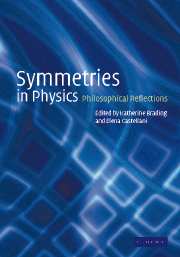Book contents
- Frontmatter
- Contents
- List of contributors
- Preface
- Copyright acknowledgements
- 1 Introduction
- Part I Continuous symmetries
- Part II Discrete symmetries
- 11 Classic texts: extracts from Leibniz, Kant, and Black
- 12 Understanding permutation symmetry
- 13 Quarticles and the identity of indiscernibles
- 14 Handedness, parity violation, and the reality of space
- 15 Mirror symmetry: what is it for a relational space to be orientable?
- 16 Physics and Leibniz's principles
- Part III Symmetry breaking
- Part IV General interpretative issues
- Index
11 - Classic texts: extracts from Leibniz, Kant, and Black
Published online by Cambridge University Press: 08 October 2009
- Frontmatter
- Contents
- List of contributors
- Preface
- Copyright acknowledgements
- 1 Introduction
- Part I Continuous symmetries
- Part II Discrete symmetries
- 11 Classic texts: extracts from Leibniz, Kant, and Black
- 12 Understanding permutation symmetry
- 13 Quarticles and the identity of indiscernibles
- 14 Handedness, parity violation, and the reality of space
- 15 Mirror symmetry: what is it for a relational space to be orientable?
- 16 Physics and Leibniz's principles
- Part III Symmetry breaking
- Part IV General interpretative issues
- Index
Summary
Leibniz's third letter to Clarke, paragraph 5
I have many demonstrations, to confute the fancy of those who take space to be a substance, or at least an absolute being. But I shall only use, at the present, one demonstration, which the author here gives me occasion to insist upon. I say then, that if space was an absolute being, there would something happen for which it would be impossible there should be a sufficient reason. Which is against my axiom. And I prove it thus. Space is something absolutely uniform; and, without the things placed in it, one point of space does not absolutely differ in any respect whatsoever from another point of space. Now from hence it follows, (supposing space to be something in itself, besides the order of bodies among themselves,) that 'tis impossible there should be a reason, why God, preserving the same situations of bodies among themselves, should have placed them in space after one certain particular manner, and not otherwise; why every thing was not placed the quite contrary way, for instance, by changing East into West. But if space is nothing else, but that order or relation; and is nothing at all without bodies, but the possibility of placing them; then those two states, the one such as it now is, the other supposed to be the quite contrary way, would not at all differ from one another.
- Type
- Chapter
- Information
- Symmetries in PhysicsPhilosophical Reflections, pp. 203 - 211Publisher: Cambridge University PressPrint publication year: 2003



